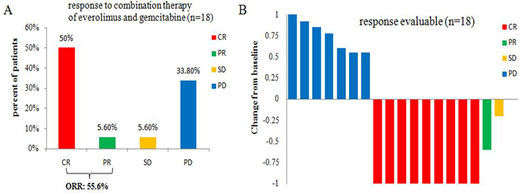Background: Relapsed/refractory Peripheral T-cell lymphomas (PTCL) is an aggressive and heterogeneous Non-Hodgkin's T cell lymphoma, which is resistant to conventional chemotherapy with poor prognosis. Therefore, there is an urgent need to exploit potential therapeutics and novel treatment for R/R PTCL. Targeting PI3K/AKT/mTOR pathway is an effective therapy for PTCL. However, recent research demonstrated that the mTOR inhibitor everolimus monotherapy has low response rate and short duration time in treating with R/R PTCL.
Methods:We retrospectively reviewed 18 patients with pathologically diagnosed T cell lymphoma who received the mTOR inhibitor everolimus combined with gemcitabine for six cycles (everolimus 10mg qd, gemcitabine 1000mg/m2 d1, every 21 days a cycle) and sequential autologous stem cell transplantation, at Guangdong Provincial People's Hospital from November 2015 through October 2019. We evaluated the objective response rate (ORR), progressive free survival (PFS) and safety.
Results:Of the 18 patients, 33.3% (n=6) had PTCL-not otherwise specified (PTCL-NOS), 27.8% (n=5) had angioimmunoblastic T-cell lymphoma(AITL), 27.8% (n=5) had anaplastic large cell lymphoma(ALCL) (anaplastic lymphoma kinase positive ALCL: 20.0%, n=1; anaplastic lymphoma kinase negative ALCL: 80.0%, n=4), and 11.1%(n=2) had other subtypes. The median age was 46.5 years (range 26-64) old and most patients were males (66.7%) with advanced stage disease (III/IV, 73.7%). The ORR was 55.6% (n=10), with complete response rate of 50% and partial response rate of 5.6%. One patient was stable disease (5.6%), and seven patients were progressive disease (33.8%). For subtypes, the ORR was 80% in ALCL, 66.7% in PTCL-NOS and 20% in AITL, respectively. With a median follow-up time of 18.9 months (range 3.1-99.6), the median PFS was 4.5 months and overall survival(OS) was 18.9 months, respectively. The most frequent hematological adverse events were thrombocytopenia (27.8%), anemia (22.2%), leukopenia (11.1%). The non-hematological adverse events were inappetence (22.2%), diarrhea (11.1%), rash(11.1%), fatigue (11.1%).
Conclusions:Our pilot studies have shown that combined everolimus with gemcitabine have better efficacy than monotherapy reported previously for R/R PTCL patients, but the mechanism is still unclear. It suggests that further investigation for mechanisms and predictive biomarker is needed.
No relevant conflicts of interest to declare.
Author notes
Asterisk with author names denotes non-ASH members.


This feature is available to Subscribers Only
Sign In or Create an Account Close Modal